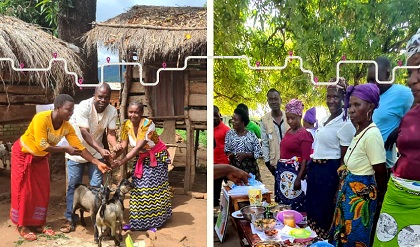Learning Route on gender transformative approaches in Malawi
31 MAY 2023
 Gender equality is a fundamental human right, a building block for social justice and an economic necessity. Yet in rural areas of developing countries, gender inequalities are all too prevalent. Women and girls experience discrimination and limited access in all areas of life.
Gender equality is a fundamental human right, a building block for social justice and an economic necessity. Yet in rural areas of developing countries, gender inequalities are all too prevalent. Women and girls experience discrimination and limited access in all areas of life.
Discriminatory laws, social norms and customary practices create disadvantages for women producers, specifically in the form of limited land rights, lack of access to productive resources, unpaid work, insecure employment, and exclusion from decision-making and political representation. For instance, recent data shows that the gender gap in land productivity between female- and male-managed farms of same size is 24% and on average, women earn 18.4 percent less than men in wage employment in agriculture. This has a detrimental effect on their and their families’ food security and nutrition.
To achieve Sustainable Development Goals 2 and 5 and realize progress towards zero hunger and gender equality, the United Nations Rome-based Agencies have committed to adopt innovative, gender transformative approaches that actively examine, challenge and change the underlying causes of gender inequality.
Taking an important step in this direction, IFAD in the context of the Joint Programme on Gender Transformative Approaches for Food Security and Nutrition (JP GTA) has partnered with Procasur to organize a Learning Route on gender transformative approaches in the district of Blantyre in Malawi from 29 May to 3 June 2023.
Through the Learning Route, IFAD and Procasur are bringing together 23 gender specialists and project technical teams from 13 countries (Central African Republic, Chad, Djibouti, Ethiopia, Ghana, Kenya, Madagascar, Malawi, Nepal, Niger, Nigeria, Tunisia and Uganda), representing 12 IFAD-funded projects as well as FAO and WFP’s Malawi country offices.
During the Learning Route, participants will develop an understanding of gender transformative methodologies and how they differ from other frameworks and approaches; learn how rural development interventions can integrate gender transformative programming in their operations throughout the programme cycle; and analyze pathways of change, results and impact at different levels - organizational, project, community, household and individual.
Over the course of six days, the Learning Route participants will exchange knowledge and experiences with their local hosts under the IFAD-funded Programme for Rural Irrigation Development (PRIDE) and the Ultra-Poor Graduation Component under the Farmer Financial Access for Rural Markets, Smallholders and Enterprise (FARMSE) Programme. The delegation will visit the communities of Matoponi and Mlooka (district of Zomba) and Nchema (district of Machinga).
Participants will then formulate ‘innovation plans’ for the replication and scaling up of gender transformative tools in their projects and programmes by adopting the knowledge and practical skills that acquired during the Learning Route.
The opening ceremony of the Learning Route took place on Monday 29 May 2023 with James Mtupanyama from IFAD’s country office in Malawi, Fred Simwaka, Deputy Director for Gender at Malawi’s Ministry of Gender, Community Development and Social Welfare, and Silvia Sperandini, Gender Specialist at IFAD who is also IFAD’s Technical Advisory Committee member to the JP GTA. After the official opening, a panel of national experts introduced participants to the household approaches and other gender transformative approaches applied in Malawi.
Image credits: ©Procasur
More information:
- Procasur - Learning Route: "Boosting Gender Transformative Approaches in Rural Development Interventions"
- Follow along: Facebook
Contact:
- Silvia Sperandini, Gender Specialist at IFAD & IFAD’s Technical Advisory Committee member to the JP GTA: [email protected]
- Fiona Funke, Knowledge Management & Communication Specialist, JP GTA: [email protected]
- JP GTA: [email protected]







